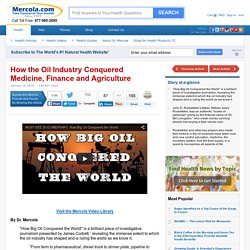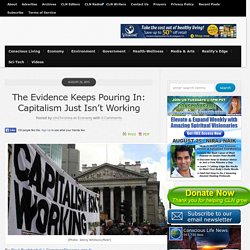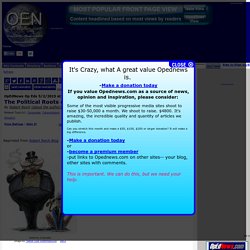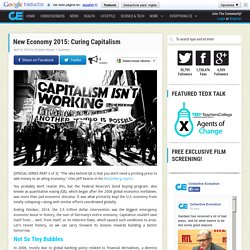

How the Oil Industry Conquered Medicine, Finance and Agriculture. By Dr.

Mercola "How Big Oil Conquered the World" is a brilliant piece of investigative journalism presented by James Corbett,1 revealing the immense extent to which the oil industry has shaped and is ruling the world as we know it. "From farm to pharmaceutical, diesel truck to dinner plate, pipeline to plastic product, it is impossible to think of an area of our modern-day lives that is not affected by the petrochemical industry. The story of oil is the story of the modern world. And this is the story of those who helped shape that world, and how the oil-igarchy they created is on the verge of monopolizing life itself. " Corbett carefully details the sordid back story of today's "oiligarchy. " Big Oil — An Industry Founded on Treachery and Deceit As noted by Corbett, certain details of the Big Oil story are well known. "When he wasn't running away from them or disappearing for years at a time, [William Avery Rockefeller] would teach his children the tricks of his treacherous trade.
John D. Beginning of Freddie Gray's life as sad as its end, court case shows. In a boxful of documents stored in Baltimore City Circuit Court, the outlines of an all-too-familiar inner-city childhood emerge.

The life of Freddie Gray Jr., who died Sunday from a severe spinal cord and other injuries sustained in police custody, had a beginning as tragic, in a way, as his end. As children, he and his two sisters were found to have damaging lead levels in their blood, which led to multiple educational, behavioral and medical problems, according to a lawsuit they filed in 2008 against the owner of a Sandtown-Winchester home they rented for four years. With so much of its housing stock predating laws banning lead in paint, Baltimore continues to wrestle with the after-effects on thousands of children who have inhaled or ingested the toxic metal.
The Evidence Keeps Pouring In: Capitalism Just Isn’t Working. Global Failures Capitalism hasn’t been able to control runaway global inequality.

For every $1.00 owned by the world’s richest 1% in 2011, they now own $1.27. They own almost half the world’s wealth. Just 70 of them own as much as 3.5 billion people. Capitalism has not been able — or willing — to control the “race to the bottom” caused by “free trade,” as mid-level jobs continue to be transferred to low-wage countries. Nor has capitalism been able to control global environmental degradation, with trillions in subsidies going to polluters that don’t even pay their taxes, and with corporations ignoring any semblance of social responsibility as they seek ways to profit from global warming. Job Creation Failures I With or without globalization, middle-class jobs are disappearing, even higher-end positions in financial analysis, medical diagnosis, legal assistance, and journalism. Reports of job recovery are based on low-income jobs, many of them part-time.
Job Creation Failures II. The Political Roots of Widening Inequality. - Advertisement - Reprinted from Robert Reich Blog Widening Inequality(image by Twitter User nvforthefuture) DMCA For the past quarter-century I've offered in articles, books, and lectures an explanation for why average working people in advanced nations like the United States have failed to gain ground and are under increasing economic stress: Put simply, globalization and technological change have made most of us less competitive.

The tasks we used to do can now be done more cheaply by lower-paid workers abroad or by computer-driven machines. My solution -- and I'm hardly alone in suggesting this -- has been an activist government that raises taxes on the wealthy, invests the proceeds in excellent schools and other means people need to become more productive, and redistributes to the needy. Most fundamentally, the standard explanation for what has happened ignores power. Yet this market view cannot be the whole story because it fails to account for much of what we have experienced.
New Economy 2015: Curing Capitalism. [SPECIAL SERIES PART 3 of 3] “The idea behind QE is that you don’t need a printing press to add money to an ailing economy,” cites Jeff Kearns in his Bloomberg report.

You probably don’t realize this, but the Federal Reserve’s bond buying program, also known as quantitative easing (QE), which began after the 2008 global economic meltdown, was more than just economic stimulus. It was what primarily kept the U.S. economy from totally collapsing—along with similar efforts coordinated globally. Ending October, 2014, the 3.5 trillion dollar intervention was the biggest emergency economic boost in history, the sum of Germany’s entire economy. Capitalism couldn’t save itself from… well, from itself, or its inherent flaws, which caused such conditions to arise. Let’s revisit history, so we can carry forward its lessons towards building a better tomorrow.
Not So Tiny Bubbles Yet, the crisis isn’t over. This means we must evolve. Aim Higher, Trickle Up Ending The 40 Hour Work Week.